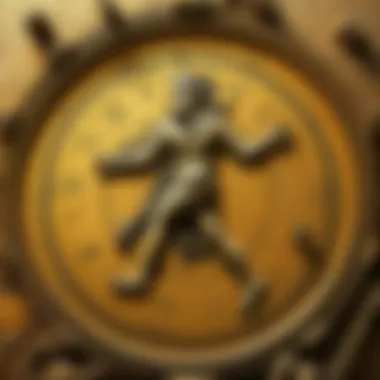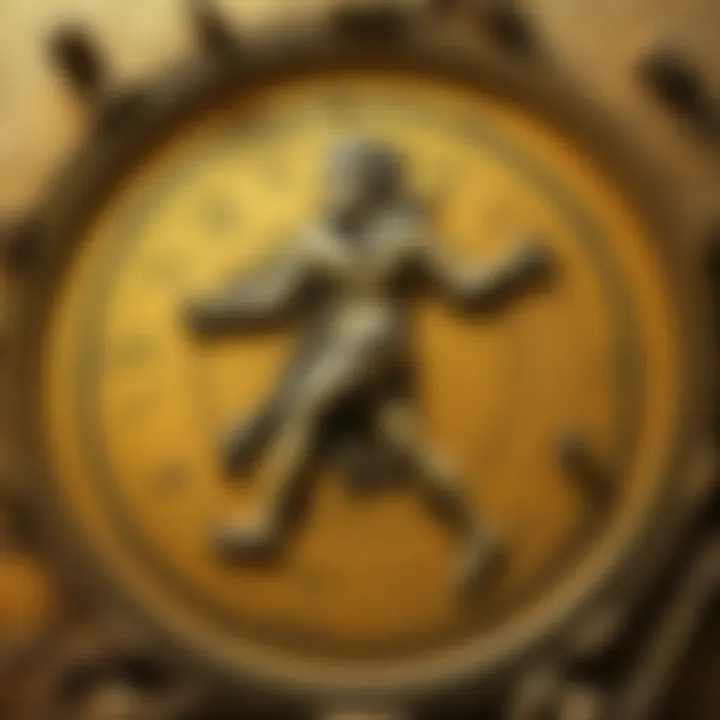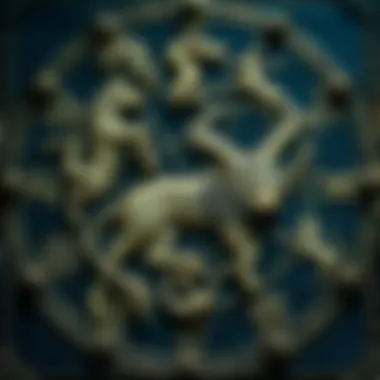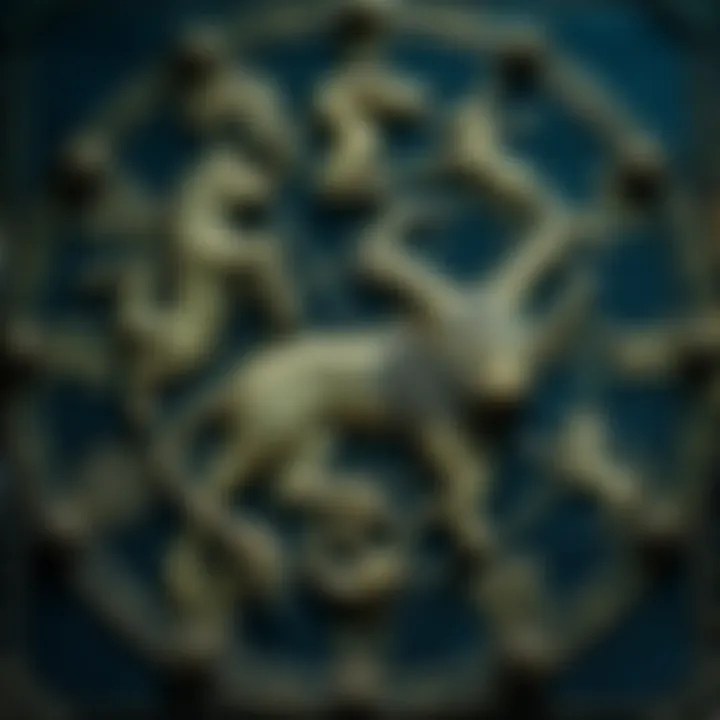The Historical Evolution of Zodiac Signs and Their Impact


Intro
Zodiac signs have captivated humanity's imagination for millennia. These celestial symbols are not just an array of star formations in the night sky; they represent a rich tapestry of history, culture, and human experience. From their inception in ancient Babylon, where astrological practices began to take shape, to the complex interpretations we see today, the journey of zodiac signs weaves through various civilizations, each adding layers of meaning and insight. The relationship between zodiac signs and astrology offers intriguing perspectives on human behavior and relationships, resonating far beyond the pages of horoscope columns. Through examining the historical context, cultural significance, and enduring appeal of zodiac signs, this article aims to unveil their profound role in our understanding of life and the cosmos.
Zodiac Profiles
The concept of zodiac signs is often encapsulated in twelve distinct personalities, each linked to a specific constellation. These profiles offer more than mere labels; they provide a framework for understanding individual traits and interpersonal dynamics. \n Here, we give a thorough overview of each zodiac sign, highlighting personality traits as well as their strengths and weaknesses.
Overview of Each Sign
- Aries (March 21 - April 19): Known for their fiery, adventurous nature, Arians are often seen as pioneers.
- Taurus (April 20 - May 20): Methodical and grounded, Taureans are practical individuals who appreciate stability.
- Gemini (May 21 - June 20): With their curious minds and social nature, Geminis are often the chameleons of the zodiac.
- Cancer (June 21 - July 22): Nurturing and intuitive, Cancers are deeply connected to their emotions and family.
- Leo (July 23 - August 22): Leos are charismatic leaders, often standing out in a crowd with their vibrant personalities.
- Virgo (August 23 - September 22): Detail-oriented and analytical, Virgos thrive on perfection and organization.
- Libra (September 23 - October 22): Librans possess an innate sense of balance and harmony, making them ideal peacemakers.
- Scorpio (October 23 - November 21): Intense and passionate, Scorpios delve into the depths of human experience.
- Sagittarius (November 22 - December 21): Adventurous and philosophical, Sagittarians seek knowledge and freedom.
- Capricorn (December 22 - January 19): Disciplined and ambitious, Capricorns often set high goals and achieve them with dedication.
- Aquarius (January 20 - February 18): Innovative and independent, Aquarians are forward-thinkers who challenge norms.
- Pisces (February 19 - March 20): Compassionate and artistic, Pisceans tend to flow with the currents of life.
Personality Traits
Each sign carries unique traits that shape its character:
- Aries: Brave, impulsive, quick-tempered
- Taurus: Determined, indulgent, stubborn
- Gemini: Adaptable, sociable, inconsistent
- Cancer: Protective, sensitive, moody
- Leo: Confident, generous, arrogant
- Virgo: Practical, critical, shy
- Libra: Diplomatic, indecisive, superficial
- Scorpio: Mysterious, loyal, vengeful
- Sagittarius: Optimistic, blunt, irresponsible
- Capricorn: Responsible, cold, pessimistic
- Aquarius: Original, aloof, unpredictable
- Pisces: Empathetic, dreamy, escapist
Strengths and Weaknesses
Understanding the inherent strengths and weaknesses associated with each sign can guide individuals in navigating their personal and professional lives. For instance, Arians' boldness can propel them into leadership roles but may also lead to rash decisions. Similarly, Virgos’ attention to detail can make them excellent planners, yet their critical nature may hinder collaboration.
"Each zodiac sign, with its unique traits, contributes an invaluable chapter to the story of humanity, embodying our hopes, dreams, and quests for understanding."
Origins of Zodiac Signs
The origins of zodiac signs lie deep in the annals of human history and cultural development. Understanding this topic shapes our view of not just astrology, but also of how ancient civilizations sought to comprehend the cosmos and their place within it. This exploration is crucial, as it offers insights into how beliefs and practices have evolved and how they remain relevant today.
Astrology’s foundations trace back to several ancient civilizations, each contributing distinct ideas and symbolic meanings to the zodiac that we know now. During this journey through history, we observe not only the technicalities of celestial observation but also the cultural significance attached to astrological signs. Each zodiac sign is packed with layers of meaning and reflection about human existence, identities, and interactions with the universe.
In brief, exploring the origins of zodiac signs imbues us with a deeper appreciation of these ancient identifiers. By reconnecting with how they crafted their understanding of the heavens, we can better grasp our modern perspectives on personality traits, relationships, and destiny based on these symbols.
Ancient Civilizations and Astrological Practices
As we delve into the realm of ancient civilizations, it becomes evident that the origins of zodiac signs are inseparable from early astrological practices. The Egyptians, for example, created complex calendars informed by their observations of the stars. They linked seasonal changes to celestial phenomena, forming the basis for understanding human experiences in relation to nature.
The Babylonians significantly shaped this development around 2000 B.C. Their sophisticated methods of recording celestial events led to the creation of the 12-fold system that we still recognize today. Each sign, ranging from Aries to Pisces, was attributed not just to constellations but also to deities, linking everyday lives with divine influence.
Cultural attitudes towards the heavens turned these practices into sacred rites, as early astronomers sought to decode the messages written in the stars.
The Role of the Babylonian Influence
The Babylonian influence on the zodiac is both profound and distinct. They were among the first to organize the various constellations into a systematic framework that categorized human behavior and destiny. This zodiacal framework subsequently permeated through to Greece and other cultures, where astrological principles were further enriched.
The Babylonians recognized twelve main signs, each connected with particular months. This establishment mirrored the lunar calendar, highlighting their meticulous observation skills and the way they synthesized this knowledge into daily life. Astrology was far more than mere prediction; it was an integral part of their spiritual and agricultural routines.
Their documentation methods, which included clay tablets inscribed with astronomical observations, became a pivotal element in preserving this knowledge through generations. In fact, this melding of their astrology with practical life led to them boasting an impressive predictive accuracy of celestial occurrences, laying the groundwork for future astrological advancements.
"The stars once illuminated paths and provided guides for decision-making—a truth as resonant today as it was in Babylonian lands."
Thus, the influence of the Babylonian zodiac is clear—it provided not just a model of the stars but a framework of understanding that would echo throughout history, influencing various cultures and shaping the astrological narrative we recognize today.
Astrological Frameworks through the Ages
Astrological frameworks are the backbone of how we interpret zodiac signs and their significance throughout history. Understanding these frameworks reveals much about the cultural and intellectual landscapes of the times they were birthed in. It's like looking through a window that shows us how different civilizations interpreted the cosmos and its influence on human life. By studying the transformations and interactions between diverse traditions, one can grasp the depths of human curiosity about destiny and fate.
Greco-Roman Adaptations
The Greco-Roman period was a pivotal era that saw the blending of earlier Babylonian astrological concepts with local beliefs, resulting in a unique astrological framework that influenced Europe for centuries.
Historically, the Greeks first encountered Babylonian astronomy and astrology through trade and later direct contact during military campaigns. They found the Babylonian twelve-sign zodiac, which correlated the movements of celestial bodies with human affairs. The Greeks adapted this framework, merging it with their philosophies and deities.
"Astrology represents a language of the stars, and through the Greco-Roman lens, it transitioned from mere fortune-telling to a profound philosophical discourse."


One of the notable figures of this time, Ptolemy, contributed significantly through his work, the Tetrabiblos. He organized and codified ancient astrological practices, emphasizing the relationship between celestial events and earthly phenomena. His writings provided a systematic approach that linked personal traits and destiny to the positions of the planets and stars. This framework allowed astrology to develop into a respected field of study, touching upon ethics, psychology, and natural philosophy.
Moreover, the lifting of astrology from the realm of superstition to a more scientific approach in ancient Greece laid the groundwork for how later generations would view and interpret astrology. As the Romans expanded their empire, they spread these astrological ideas through their conquests, intertwining them with local traditions. The adaptation of astrology by the Romans included adding their own interpretations and myths, which further enriched the existing framework.
Connection to Astronomy
The relationship between astrology and astronomy is as intricate as it is significant. In ancient times, these two disciplines were not seen as separate; instead, they were part of a broader understanding of the universe.
Astronomy, as a scientific field, focused on the celestial bodies—their movements, phases, and alignments. Astrology, on the other hand, sought to interpret the meanings behind these movements and how they could have implications for human life. This intertwined nature meant that early astrologers were also astronomers. They meticulously observed the heavens, using their findings to inform astrological readings, keeping extensive records of celestial events in tablets and scrolls.
Consider the Heliocentric model proposed by Copernicus, which shifted the understanding of our solar system. This shift did not erase astrology but forced it to adapt once again. In the Renaissance, this adaptability was evident with figures like Kepler, who tried to reconcile astrological ideas with the emerging fields of physics and mathematics.
The connection to astronomy remains relevant today, as modern astrologers use sophisticated software and astronomical data to create accurate charts and interpretations. Astrology today incorporates astronomical precision, reflecting the evolution of both disciplines. This integration is crucial, as it ensures that astrology stays relevant as new discoveries in astronomy challenge and refine ancient beliefs.
The enduring bond between these frameworks highlights the collective historical pursuit of understanding our place in the cosmos. As we delve deeper into zodiac signs and their meanings, appreciating these frameworks illuminates the broader context of astrology's journey through the ages.
Zodiac Signs in Eastern Astrology
Zodiac signs in Eastern astrology offer a rich tapestry that contrasts sharply with their Western counterparts. In exploring this section, one can see how cultural contexts shape the understanding of zodiac signs, revealing unique interpretations and significances. This diversity is essential for anyone studying astrology, as it underscores the idea that celestial influence can be perceived in myriad ways across different civilizations. Notable elements include the Chinese Zodiac's cyclical nature and Indian astrology's deep-rooted traditions, both of which provide different lenses through which to view human experiences and identity.
Chinese Zodiac: A Different Perspective
The Chinese Zodiac consists of a 12-year cycle, where each year is represented by a specific animal: Rat, Ox, Tiger, Rabbit, Dragon, Snake, Horse, Goat, Monkey, Rooster, Dog, and Pig. Each animal symbolizes distinct traits and personality characteristics. For example, the Dragon is often seen as a powerful figure associated with ambition, while the Rabbit symbolizes peace and sensitivity.
- Cycles and Elements: The interplay of the cycle of animals and the five elements - Wood, Fire, Earth, Metal, and Water - adds layers of complexity. This results in a more nuanced characterization, as a person born in a certain year is also influenced by the element associated with that year. For instance, a Fire Horse is seen as more dynamic than an Earth Horse.
- Cultural Significance: Each animal year corresponds with various cultural practices. Festivals, like the Lunar New Year, for instance, revolve around these zodiac signs, emphasizing their role in societal cohesion and community identity.
"The Chinese Zodiac doesn't just mark time; it marks the essence of who we are as individuals in a community based on lunar cycles."
This perspective illustrates how zodiac signs are embedded in societal rhythm, urging us to consider our yearly approaches based on different animal energies.
Influence of Indian Astrology
Indian astrology, or Jyotish, weaves a different narrative with zodiac signs that focus on individual birth charts. The twelve signs, similar to the Western zodiac, provide a structure for understanding personality traits and life paths. However, Indian astrology also emphasizes the role of the Moon and its positioning at the time of birth, thus creating unique charts known as Kundlis. The significance here is profound; one's Moon sign can drastically differ from their Sun sign, adding depth to astrological readings.
- Naksatras and Moon Signs: The Indian system recognizes the concept of Naksatras or lunar mansions. These 27 divisions are crucial for reading and interpreting personality and fate, making Indian astrology notably different from its Western counterpart.
- Cultural and Spiritual Dimensions: The tradition is deeply integrated with spirituality, often guiding individuals in their decision-making processes. Important life events like marriage and career choices are often informed by astrological readings, highlighting the daily relevance of zodiac signs.
In examining these elements, one realizes that Eastern astrology serves a more intricate purpose than merely defining personality traits. It embodies a way of life, a belief system through which individuals interpret their experiences and relationships.
Thus, the exploration of zodiac signs in Eastern Astrology doesn’t just provide insights into human behavior; it reveals how cultures translate cosmic phenomena into daily living and human connections.
Cultural Interpretations and Symbolism
The cultural interpretations and symbolism surrounding zodiac signs form an intricate tapestry, reflecting human thoughts and beliefs across time and societies. This fascination with the stars can be traced back to ancient cultures, where people used the mundane patterns of celestial movements to craft meanings and narratives that resonated deeply within their societal framework. The exploration of such interpretations sheds light not only on the zodiac itself but also on the collective psyche of humankind, revealing how deeply intertwined our identities are with the cosmos.
Zodiac Signs in Literature and Art
Literature and art have historically served as vehicles for cultural expression, and zodiac signs are no exception. Each of the twelve zodiac signs has transcended its astrological roots to find its place in various forms of artistic expression. They have become metaphors for human traits, emotions, and aspirations, allowing authors and artists to explore the human experience in nuanced ways.
Take for instance the works of Shakespeare, whose characters often mirror zodiacal traits. Hamlet, marked by the pensive nature of a Scorpio, showcases depth and intensity, while the jovial and carefree nature of a Sagittarius can be found in the uplifting spirit of characters like Sir Toby Belch from "Twelfth Night". Here, zodiac signs don’t just sit as separate entities; they weave into the fabric of narrative, enhancing character development and thematic undertones.
In art, the zodiac has inspired countless masterpieces. The famed tapestries of Aubusson, with their illustrations of the zodiac wheel, encapsulate how these symbols can represent the cycles of life itself. Artists like Gustav Klimt pulled elements from astrology to embody the complexity of love and relationships, using zodiac imagery to deepen the emotional impact of his creations. Thus, through literature and art, zodiac signs transform from mere symbols to profound representations of our collective cultural consciousness.
Philosophical Implications of Zodiac Signs
The philosophical implications of zodiac signs penetrate the surface of astrological realms and delve into essential questions about existence, identity, and freedom. Each sign embodies a spectrum of qualities that challenge individuals to reflect on their existence within the grand cosmic order. For instance, the nature of Gemini—the duality represented by this sign—raises inquiries about the self and the multiple identities we navigate daily. It prompts us to ponder the dualities we experience in our lives.
Astrologers often posit that understanding one’s zodiac sign can lead to self-awareness and personal growth. By examining how the qualities of a specific sign correspond with personal experiences, individuals unlock insights about their intrinsic motivations and possible blind spots. This idea aligns with the philosophical tenet of introspection, suggesting that examining our traits can guide us toward understanding our purpose.
Furthermore, zodiac signs can serve as tools for interpreting interpersonal relationships. Belief in zodiac compatibility invites philosophical dialogue about free will and determinism, raising questions about how much weight we ascribe to celestial influence versus personal choice. For example, many wonder if a person’s inherent qualities dictated by their zodiac sign inevitably shape their relationships or if love can transcend these predetermined traits.
Whether we see zodiac signs as guiding lights or mere tools of introspection, their presence across cultures and disciplines affirms their role as constructs that intertwine with humanity’s quest for meaning.
Development of Zodiac Signs in the Middle Ages


Understanding the Development of Zodiac Signs in the Middle Ages is crucial for interpreting not only the evolution of astrology but also its pivotal role in shaping the cultural landscape of Europe. This era, marked by a mingling of traditions and knowledge, laid the groundwork for how astrology would intertwine with various beliefs, practices, and sciences in subsequent centuries. By examining the intricate tapestry of influences, we can grasp the significance of zodiac signs as more than mere astrological symbols; they became frameworks for understanding human experience and the cosmos itself.
Astrology in Medieval Europe
In the medieval period, astrology began to flourish within Europe, largely influenced by the texts translated from Arabic and ancient Greek sources. Scholars such as Roger Bacon and William of Auvergne championed astrology as a legitimate science, intertwining it with natural philosophy. The zodiac, with its twelve distinct signs, became central to astrological charts, which were believed to reveal truths about individual fates.
Key Elements of Medieval Astrology:
- Integration of Astronomy: Astrology was closely associated with celestial mechanics. Understanding the movements of planets and stars was deemed essential in providing accurate predictions based on zodiac signs.
- Personal Horoscopes: By this time, the practice of casting personal horoscopes took root, where astrologers would create detailed charts based on the positions of celestial bodies at one’s birth, linking the zodiac signs to personal traits and destinies.
- Astrological Medicine: The zodiac also played a role in medieval medicine. Different signs were assigned to various body parts, and practitioners believed that aligning treatments with astrological principles could lead to better healing outcomes.
In this context, the zodiac wasn't simply a collection of symbols; it was intertwined deeply with societal norms, superstitions, and the quest for knowledge. People found solace and guidance in these signs, pondering their implications for personal and communal wellbeing.
Influence of the Islamic Golden Age
During the Middle Ages, the Islamic Golden Age was paramount in preserving and enhancing the knowledge of astrology and astronomy. Scholars from this period not only translated classical texts from Greek and Latin but also contributed their own insights, significantly enriching the body of astrological knowledge available to medieval Europeans.
Notable Contributions:
- Al-Khwarizmi and Al-Battani, for instance, made strides in understanding celestial movements and the calculations necessary for astrological predictions, which were foundational for future European practices.
- Astrolabes, advanced tools developed in this era, allowed for more precise observations of the stars, significantly influencing how zodiac signs were interpreted in astrological charts.
- Astrology in Islamic Culture: Unlike the often fraught relationship between religion and astrology in medieval Christian Europe, Islamic scholars embraced astrology as an integral part of their scientific inquiry, enhancing its credibility and fostering a more robust discourse around celestial influences.
Thus, the synthesis of knowledge from the Islamic Golden Age profoundly affected the evolution of zodiac signs, allowing Europe to draw from the depth of Middle Eastern astronomical advancements. This cross-cultural exchange underscored a shared human curiosity about the cosmos and our place within it, cementing the relevance of astrological practices.
"Astrology is a bridge between the heavens and earth, a way to grasp the infinite complexity of human existence through the simplicity of the zodiac signs."
In summary, the Medieval era and the Islamic Golden Age significantly shaped the development of zodiac signs, setting the stage for their continued relevance. As scholars of astrology began to align these signs with personal identity and destiny, they crafted a narrative that resonated far beyond mere superstition, embedding itself as a critical part of medieval cultural identity.
Modern Interpretations of Zodiac Signs
Modern interpretations of zodiac signs play a crucial role in demystifying how astrology is perceived today. In an era where ancient wisdom meets contemporary thought, the practical applications of zodiac insights have burgeoned, shaping personal identities and beliefs. This section delves into how these interpretations influence our understanding of self and the connections we foster with others.
Psychological Perspectives on Astrology
The psychological facets of astrology have recently gained traction, particularly within the frameworks of personality assessment and self-reflection. Evidence suggests that many individuals turn to their zodiac signs not just for predictions but to cultivate a deeper understanding of themselves and their behavioral tendencies.
Astrology often resonates on a psychological level, providing a language for discussing traits and influences. For instance, someone might identify strongly with their Leo attributes—confidence and leadership qualities—using this as a framework to enhance their strengths in professional settings.
Additionally, psychological studies have explored how zodiac signs can influence interpersonal relationships. These traits may guide individuals in assessing compatibility with others, leading to more harmonious interactions. Some research suggests that viewing personality through the lens of astrology can cultivate empathy, as it encourages people to appreciate differences in character.
In this way, astrology often provides a mirror for personal exploration, essentially functioning as a self-help tool. While skeptics argue that it lacks empirical backing, its popularity indicates a demand for frameworks that help individuals navigate complexities of human behavior and their interactions within society.
Zodiac Signs in Popular Culture
Zodiac signs have transcended the niche circles of astrology enthusiasts and integrated themselves into the fabric of popular culture. From social media to fashion, zodiac motifs provide a relatable cultural reference that many people embrace. For instance, Instagram and TikTok have seen a wave of content creators focusing on horoscopes, astrology-based memes, and personality quizzes. These platforms harness the allure of zodiac signs, inviting participation through lighthearted, yet poignant, discussions about personality traits and compatibility.
Moreover, fashion brands have capitalized on the cultural significance of astrology. Ganni and Madewell have launched collections inspired by zodiac signs, offering apparel and accessories that allow fans to express their astrological affiliations. This connection underscores how zodiac signs can promote community and self-expression, often igniting discussions about traits associated with each sign.
The influence of zodiac signs extends beyond mere representation in social spaces. Podcasts like "Astrology with Heather" and YouTube channels share in-depth explorations of zodiac traits, and how they relate to contemporary issues and personal growth. These platforms invite individuals to engage with astrology in a meaningful way, often sparking curiosity and debate about its relevance.
As astrology melds into mainstream discourse, it continues to shape societal opinions and personal identities, illustrating the adaptable nature of ancient traditions in a modern context.
Astrology's Impact on Personal Identity
Astrology offers a nuanced framework for understanding personal identities, influencing how individuals perceive themselves and their place in the world. Many find that their zodiac signs provide a lens through which they can explore their traits, aspirations, and relationships. The impact of astrology in this regard extends beyond simple horoscopes; it delves into character analysis, emotional tendencies, and interpersonal dynamics.
When individuals align their self-concept with their zodiac signs, they often feel a greater sense of purpose and belonging. Here are a few ways astrology interacts with personal identity:
- Self-Reflection: Through understanding zodiac traits, one can engage in deeper self-reflection. For instance, a Leo might recognize their need for creativity and recognition as intrinsic to their identity.
- Personal Growth: Awareness of one's astrological attributes can guide personal development. An Aries, known for their initiative, might channel their ambitious nature towards entrepreneurial pursuits.
- Community Building: Zodiac signs can foster a sense of community. People often find kinship with those of the same sign or compatible signs, establishing bonds based on shared traits and experiences.
The knowledge of our zodiac sign can shape self-awareness and influence life choices in profound ways.
Recognizing how signs align with individual narratives enhances overall self-understanding. Moreover, personality traits attributed to different zodiac signs often lead to a sense of acceptance, urging individuals to embrace both strengths and weaknesses.
Zodiac Signs and Individual Traits


Each zodiac sign is laden with a rich tapestry of characteristics that can influence behaviors and motivations. Understanding these traits not only caters to personal growth but also aids in relationship dynamics. For instance, Taureans are reputed for their stubbornness, yet this trait often translates into determination and reliability.
Here’s a glimpse of how different signs can embody various traits:
- Aries: Ambitious and impulsive, they often lead with zeal.
- Taurus: Grounded and practical but holds a strong sense of ownership.
- Gemini: Adaptable and curious, making them the social butterflies of the zodiac.
- Cancer: Deeply emotional and nurturing, often prioritizing family connections.
- Leo: Charismatic and confident, they shine brightly in social settings.
- Virgo: Detail-oriented and analytical, preferring order and predictability.
- Libra: Diplomatic and social, they thrive in partnerships and relationships.
- Scorpio: Intense and passionate, with a flair for the mysterious.
- Sagittarius: Adventurous and philosophical, they seek freedom and knowledge.
- Capricorn: Disciplined and ambitious, with strong leadership qualities.
- Aquarius: Innovative and independent thinkers often championing humanitarian causes.
- Pisces: Intuitive and compassionate, deeply connected to their emotions and the world around them.
The interplay between these individual traits and personal identity allows for a greater appreciation of one’s nuances. When one understands their innate characteristics, it can inform life decisions and relationships, creating a more harmonious existence.
Compatibility Analysis Based on Zodiac Signs
Compatibility analysis through zodiac signs is not merely about romantic relationships; it extends into friendships, professional affiliations, and familial bonds. Each sign interacts uniquely with others, creating specific dynamics that can either foster connection or lead to friction. For example, the communicative Gemini may clash with the more reserved Capricorn, yet both can find common ground through shared experiences.
Here’s how compatibility analysis benefits individuals:
- Awareness of Strengths and Weaknesses: Understanding how different signs interact can highlight potential areas of conflict or harmony. For instance, two fire signs, like Aries and Leo, may energize each other, while an earth and fire combination, like Taurus and Aries, may create tension unless both parties are willing to compromise.
- Enhancing Communication: Awareness of traits can improve communication styles. For example, a Libra and a Scorpio may approach conflict differently, with the Libra preferring diplomacy and the Scorpio valuing depth. Acknowledging these differences can strengthen relationships.
- Guiding Relationship Decisions: Individuals often seek compatibility insights when initiating relationships. Astrology can serve as a guide, helping to assess prospects based on zodiac alignments, therefore promoting more informed decisions.
Overall, astrology's influence on personal identity reflects a multifaceted journey of discovery. By appreciating zodiac characteristics and analyzing compatibility, individuals can cultivate deeper connections with themselves and others, leading to richer life experiences.
Controversies and Critiques of Astrology
As with any intricate subject, astrology is not without its fair share of controversies. This section delves into the critics' arguments against astrology and highlights the complexities surrounding these claims. Understanding these controversies is crucial for gaining a complete perspective on the astrological discourse, especially for enthusiasts eager to explore the deeper meanings of zodiac signs. Critics argue that the foundation of astrology rests on shaky ground, leading to numerous debates in scientific circles, philosophy, and even among lovers of the mystic arts. Dissecting these critiques allows enthusiasts to separate the wheat from the chaff, fostering a more nuanced understanding of astrology's role in contemporary society.
Scientific Perspectives on Astrology
The scientific community's stance on astrology is largely skeptical. Most scientists argue that astrological claims lack empirical support and that the mechanisms described by astrologers do not align with known laws of physics. For example, critiques often point to the absence of causality; how, they question, can a constellation light-years away affect human behavior?
Nevertheless, a subset of researchers and thinkers have sought to bridge traditional astrological practice with scientific inquiry, conducting studies that consider the potential psychological benefits of astrology. Some surveys, albeit small-scale, show that people who engage with astrological practices often report enhanced personal understanding or emotional comfort. Such findings can be a gamechanger in the astrology debate, maybe not validating astrology through a scientific lens, but ushering in a fresh dialogue about mental health and self-awareness.
"It's not about whether stars influence us, but rather how we interpret our own lives through them."
Debunking Myths: Astrology vs. Astronomy
Astrology is often confused with astronomy, leading to misconceptions that deserve clarity. It's critical to differentiate between the two: astronomy gets its roots in empirical data observation, studying celestial bodies and their physical properties, while astrology interprets meanings and supposed influences of these bodies on human affairs.
Common misconceptions include:
- Misalignment of Zodiac Signs: Many claim that due to the Earth’s axial precession, zodiac signs no longer align with their corresponding constellations. While this is true, zodiac signs are primarily symbolic and not tethered to actual star positions for astrological practice.
- Scientific Rejection as Dismissal of Superstitions: Critics often label astrology as mere superstition. This dismissal overlooks its historical significance and cultural relevance, hinting at a more profound societal yearning for meaning and connection.
- Astrology as a Predictor: Many skeptics claim astrology fails predictively. If one approaches it as a strict, predictive science, they might be disappointed, yet as a tool for reflection or guidance, it may serve a purpose for many.
In summary, while the critiques range from scientific dismissal to philosophical arguments, it’s important for enthusiasts to engage with both the criticisms and the beliefs in astrology. This kind of engagement not only enriches personal understanding but also cultivates a more profound respect for a practice that has existed for millennia.
Future Directions of Zodiac Sign Studies
The future of zodiac sign studies seems poised on the brink of significant transformation. As societal beliefs evolve and the intersection of technology and astrology deepens, a whole new realm of understanding is gesturing for exploration. This section delves into some emerging trends and technological advancements that may influence how we interpret zodiac signs in the coming years.
Emerging Trends in Astrological Research
Astrology has long been scrutinized and debated. Recently, however, it has begun to assert itself more strongly within academic discussions and popular culture. The fusion of astrology with psychology is one notable trend that's gaining traction.
Research papers emerging from universities are starting to explore the psychological underpinnings of astrological belief systems. This approach examines how zodiac signs might contribute to one's identity formation and personality traits. By utilizing surveys and in-depth interviews, researchers are trying to decode the subjective experiences of individuals who identify strongly with their zodiac signs.
A few key trends include:
- Astro-Psychology: A growing interest in how astrological profiles correlate with personality assessments, such as the Myers-Briggs Type Indicator.
- Social Astrology: Investigating the role zodiac signs play in social networks and interpersonal dynamics, especially in contexts like dating apps.
- Astrology and Wellness: This trend aligns astrological practices with holistic health approaches, where zodiac signs might influence lifestyle choices, dietary habits, or mental wellbeing.
These avenues are essential as they affirm the relevance of zodiac signs beyond mere entertainment, shedding light on their potential implications for personal growth and societal connections.
The Role of Technology in Astrology
Technology's hand in reshaping astrology cannot be overlooked. With the rise of digital platforms, astrology has become more accessible; applications like Co-Star and The Pattern have opened doors for people to engage with astrological insights in everyday life. These platforms utilize algorithms to process astronomical data, providing personalized horoscope readings tailored to each user's natal chart.
Additionally, advancements in artificial intelligence have the potential to fine-tune astrological interpretations. Here are a few areas where technology is making its mark:
- Data Analysis: Machine learning algorithms can analyze vast troves of astrological data, enabling forecasts that are more precise than ever before.
- Interactive Platforms: Online forums and social media allow individuals to share experiences, fostering a community around shared beliefs and practices. This trend further validates astrology's place in modern society.
- Astrology Integration in Everyday Tools: The integration of astrological insights into personal assistant tools, like Google Calendar, facilitates user engagement in a seamless manner.
The interplay of technology and astrology paves the way for future innovations that might render classical astrology practices more relevant to younger generations. Whether you're a seasoned enthusiast or just dipping your toes into this world, the possibilities for understanding zodiac signs continue expanding, inviting everyone to consider how the stars might influence our lives in unforeseen ways.
"The stars don't dictate your destiny; they reflect the possibilities that lie within you."
For those interested in further exploration, consider checking resources such as Wikipedia and academic studies available on university websites.
Through these lenses, the ongoing journey of zodiac signs promises to be fascinating, providing layers of comprehension that can enhance our understanding of human nature, connection, and the cosmos.



